


One hundred years later, Professor Van Helsing arrives in China to learn about Chinese vampires. Addressing the Professors of Chongqing University, he tells a story about a small village which is under the thrall of the 7 Golden Vampires. This story is played out as almost a self-contained horror story, as a farmer discovers that his daughter has been kidnapped by Kah (presumably actually Dracula) along with a number of other young women, and charges in to save them. Both the farmer and his daughter are killed, but not before he manages to kill one of the 7 Golden Vampires, who are accompanied by a huge horde of other vampires that have risen from the grave to do Kah/Dracula's bidding. Some of these vampires can be seen to hop, following the tradition of the Chinese hopping vampire that was later used in Sammo Hung's Mr. Vampire series.
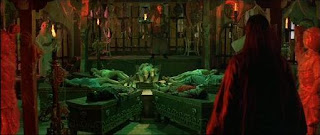

Anyway, the response of the learned audience is to say something along the lines of "You stupid European peasants might fall for such superstitious bullshit, but here in China we have a civilisation going back thousands of years, so please credit us with some intelligence," as they all walk out on him.
Later he is approached by a man who had attended the lecture, Hsi Ching (David Chiang, The Water Margin, New One-Armed Swordsman), who claims to be from the village Van Helsing had spoken of and asks for his assistance in killing the 7 Golden Vampires. Finance is put up by a rich widow, Vanessa Buren (Norwegian model Julie Ege, Up Pompeii, Rentadick) and the team set out accompanied by Hsi's sister and six brothers, all kung fu experts. Van Helsing's son Leyland tags along as well.
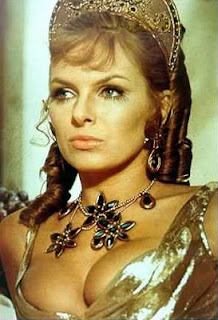
The rest of the movie basically follows this troupe as they make their way to the village, getting into kung fu fights with bandits and later with vampires, until they finally reach the cursed village and get to fight the 7 Golden Vampires. There are a couple of surprises along the way.
First of all, I expected the character of Vanessa to be a love interest for Leyland Van Helsing, and indeed at first he does seem to be courting her, but he is soon put off by her independent ways. ("They'll be wanting the vote next!") Leyland finds himself much more taken with Mai Kwen (Shih Szu), who despite being a kick-ass kung fu fighter is portrayed in non-fighting scenes as being submissive (as was typical of Western portrayals of Asian woman who weren't actively evil). So far so boringly normal.

Much more interesting is that Vanessa turns out to be the love interest of Hsi Ching. This is very unusual indeed. Asian men are usually denied any kind of sexuality in Western movies - even today - unless it is to ridicule them. (Think of Long Dong Duk in Sixteen Candles.) To pair David Chiang with Julie Ege would have been positively revolutionary at the time. Unfortunately it doesn't quite pay off - one of these couples lives and one of them dies, and you get exactly one guess as to which is which. However the death scene is a real doozy: Vanessa has been bitten by a vampire and turned, and goes on to bite Hsi; his response, realising that he will also turn, is to impale them both together on the same stake.
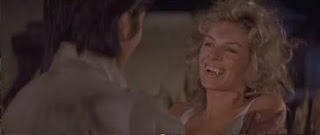
Another surprise is that the kung fu fighting is actually pretty good. I knew that the movie was packed to the gills with stars of Shaw Brothers movies, as this is a co-production between Hammer and Shaw, but I expected that Roy Ward Baker's typically stodgy direction would get in the way. From what I've since read (in the book Roy Ward Baker by Geoff Mayer) Baker wanted to direct all the kung fu fighting himself, but after producer Run Run Shaw viewed the rushes from his first attempt, he insisted on bringing in Chang Cheh to handle these scenes with a second unit.



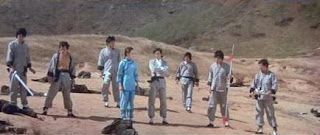
Chang Cheh is one of the absolute masters of martial arts cinema. For a point of reference, John Woo considers him to be his mentor. He directed such movies as The One-Armed Swordsman, Five Deadly Venoms, Golden Swallow, and (my favourite) the epic The Water Margin. Cheh used his favourite choreographer Lau Kar-Leung (who went on to direct such classics as 36 Chambers of Shaolin, 8-Diagram Pole Fighter and the Jackie Chan movie Drunken Master II) and many of his regular stars and stuntpeople. I wouldn't say that Legend of the 7 Golden Vampires represents anything like their best work, but it's respectable, and the movie never gets TOO dragged down in scenes of the Van Helsings holding their own against obviously-superior opponents.
Cheh was the director most responsible for bringing explicit bloodshed to the Chinese/Hong Kong martial arts movie, so it's good to see plenty of the red stuff being splashed around here. Shaw Brothers blood actually resembles Hammer blood quite closely, so there's a definite link in styles there, even if Cheh's fluid direction clashes somewhat with Baker's more static mise-en-scène.
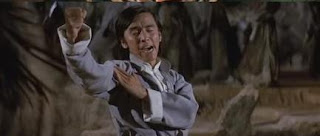
The sexual element of vampirism is far less pronounced than in Hammer's previous Dracula movies. The reason for this is simply that Dracula himself is even more of a background figure than usual (sadly we are spared any scenes of a kung fu Dracula) and the 7 Golden Vampires all appear as desiccated corpses, with no obvious sex appeal and no apparent sex drive. However, Baker confirms his reputation as Hammer's most exploitation-minded director in several scenes of topless Chinese women being tortured by Kah/Dracula and the 7 Golden Vampires.

The end of the movie is a little anticlimactic. After a huge final battle, in which all of the seven brothers and the 6 remaining Golden Vampires are all killed, Van Helsing faces off with Kah and convinces him to resume his original form as Dracula before easily staking him. The End!

John Forbes Robertson is, erm, not good as Dracula. He's wearing silly theatrical makeup (reminiscent of that worn by Howard Vernon in Jess Franco's Dracula Prisoner of Frankenstein) and is dubbed by someone else. I'm not surprised that Christopher Lee refused this one, but it's a damned shame they didn't cast someone who could fight, act, or at least look the part.
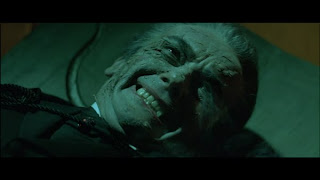
Cushing is fine as Van Helsing, even though the character should be dead. Hammer continuity is often poor, but this really pushes it. In Dracula AD 1972, Van Helsing is shown to die in 1872; this movie is set in 1904 and he's still moving about quite a bit. I thought that perhaps he might be Lawrence Van Helsing Jr., but reference is made in the movie to him being the one who had fought Dracula, which kills that theory.
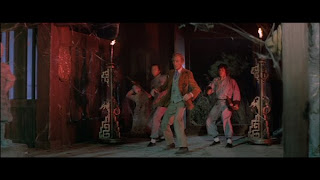
(Speaking of Van Helsing descendants: if Leyland actually stays with Mai Kwen, then I guess this means that Lorimer and Jessica Van Helsing are part Chinese. Hammer never did follow Bram Stoker's line about Dracula being a corrupting foreign influence, so it's great to see them actively promoting miscegenation in this movie - even to the point of letting non-white men get with white women, which is still somewhat taboo.)

A bigger continuity problem comes from Dracula himself, who takes on the form of Kah in 1804, heads to China, and is still there in 1904. Even if we presume that none of the previous movies actually happened, there are multiple references to his previous fights with Van Helsing. Was Dracula a dual citizen throughout the 19th Century, dividing his time between China and Europe and changing his appearance constantly? I guess it's possible, but it seems more likely that scriptwriter Don Houghton (who also wrote Dracula AD 1972 and The Satanic Rites of Dracula) just didn't think about it ever hard. Or possibly didn't think about anything ever, or even comprehend the meaning of the verb "think". Amazing to think that this guy had already written some pretty decent Doctor Who stories and went on to write a good one for Sapphire & Steel. Maybe he was in the middle of a massive drug binge when he was working for Hammer. Maybe he just didn't give a damn. He died 19 years ago (to the day as it turns out - I feel a little bad talking shit about him now) so we'll probably never know.
At least we were spared another of those awful ITV soundtracks! James Bernard's score is apparently mostly pieced together from pieces of his earlier ones, and I'm still not a huge fan, but it's a vast improvement over what we had to put up in the previous two movies. As is the rest of the movie - except, of course, for Dracula.

Here ends my Hammer Dracula marathon. Hammer would only produce one more horror movie after this, the dreadful Dennis Wheatley adaptation To the Devil... A Daughter, as well as a handful of movies based on British sitcoms and a remake of Hitchcock's The Lady Vanishes. It's a shame that they didn't get to continue putting Dracula into more modern and exotic genre movies. It would have been cool to see them get together with Toho to try and revive two dying franchises at once with Dracula vs. Godzilla.

Next week, a short-lived movie series that was much more successful at bringing the Count into the 1970s.
(Well, more commercially successful anyway. And it's not really Count Dracula himself, though he does make a cameo appearance at the start of the first movie. It also features much better music.)
Ladies and gentlemen, next week I bring you... Blacula!






No comments:
Post a Comment